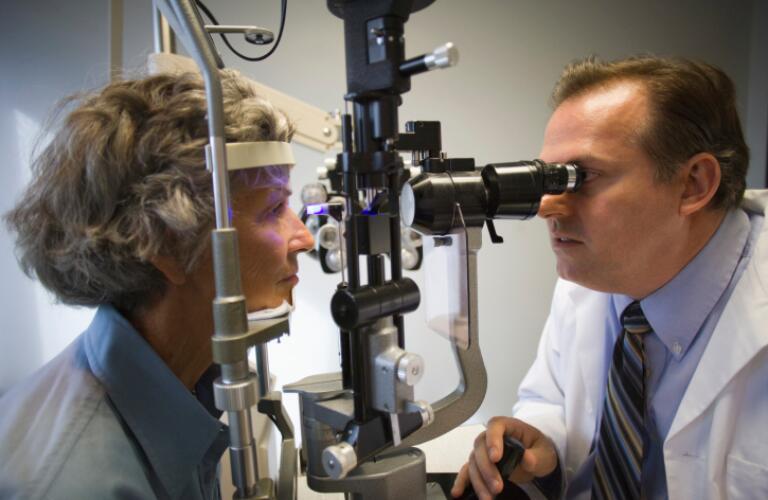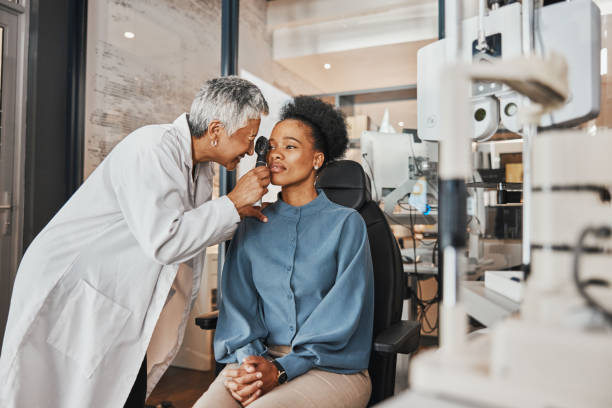Locate an Optometrist Near Me for Your Eye Health
Locate an Optometrist Near Me for Your Eye Health
Blog Article
The Relevance of Normal Eye Exams: Insights From a Seasoned Ophthalmologist
Normal eye exams offer as a critical element of medical care that prolongs past mere vision modification. An experienced eye physician can offer understandings right into exactly how these assessments not just find common eye problems however also expose underlying wellness problems that may or else go unnoticed. The quiet progression of diseases such as glaucoma and macular deterioration highlights the need of very early detection. Comprehending the frequency and importance of these evaluations can inevitably influence one's long-term wellness trajectory, increasing the question of how typically people should prioritize their eye health in the context of total wellness.
Advantages of Normal Eye Exams
Although numerous individuals may overlook the value of regular eye tests, these assessments play an essential duty in preserving total wellness and well-being. Routine eye evaluations serve not just to analyze vision yet likewise to detect early signs of systemic health concerns, consisting of diabetic issues and hypertension. By recognizing these conditions at their inception, patients can get prompt interventions, substantially enhancing long-lasting end results.
In addition, eye examinations can help in keeping an eye on existing health and wellness issues, guaranteeing that any kind of changes in vision or eye health are quickly addressed (optometrist). The evaluations permit customized recommendations regarding eyeglasses, way of life adjustments, and protective procedures versus potential eye pressure or damage
Beyond physical health and wellness, the benefits of regular eye tests expand to improving quality of life. Eventually, prioritizing eye examinations cultivates a positive method to wellness administration, empowering individuals to take fee of their well-being.
Common Eye Conditions Detected
Normal eye tests contribute in discovering a variety of typical eye problems that can considerably impact vision and general health. Among one of the most widespread conditions recognized during these examinations are refractive mistakes, including myopia (nearsightedness), hyperopia (farsightedness), and astigmatism. These conditions typically manifest as obscured vision and can be quickly fixed with prescription glasses or contact lenses.
Furthermore, cataracts, which create clouding of the lens, are frequently identified in older grownups. This condition can bring about decreased vision and needs medical intervention for resolution. Another typical concern is glaucoma, a group of eye conditions that harm the optic nerve, typically connected to boosted intraocular pressure. Early discovery is essential as it can stop irreparable vision loss.
Age-related macular deterioration (AMD) is an additional substantial condition that impacts central vision, especially in people over 50. Finally, diabetic person retinopathy, a difficulty of diabetic issues, can result in severe vision impairment otherwise kept an eye on frequently. Through comprehensive eye exams, these conditions can be determined early, permitting timely monitoring and treatment to maintain vision and improve lifestyle.
Importance of Early Discovery
Early discovery of eye conditions plays a vital duty in maintaining vision and stopping substantial wellness complications. Many eye illness, such as glaucoma, diabetic person retinopathy, and age-related macular deterioration, can progress quietly without obvious signs and symptoms in their beginning. By the time symptoms materialize, irreparable damages may have happened, leading to irreversible vision loss.
Normal eye tests promote early medical diagnosis, permitting timely intervention and treatment. As an example, treating elevated intraocular pressure can stop the beginning of glaucoma, while managing blood glucose levels can considerably reduce the threat of diabetic retinopathy. In addition, problems like cataracts can be efficiently taken care of with medical treatment when recognized early.

Just How Often Should You See?
Establishing the frequency of eye exams is important for keeping optimal eye wellness and vision. The general suggestion for grownups is to have a thorough eye test every one to 2 years, depending on individual danger variables and her comment is here age. For people aged 18 to 60, a test every 2 years is generally sufficient if no vision troubles are present. Nonetheless, those over 60 need to consider annual tests, as the threat of age-related problems raises significantly.
Individuals with details risk aspects, such as a family history of eye condition, diabetic issues, or existing vision troubles, may need even more constant assessments. Kids must have their very first eye exam at 6 months of age, adhered to by added examinations at age three and prior to getting in institution. Normal check-ups during youth are essential as vision can change quickly throughout developmental years.
Inevitably, the regularity of brows through should be customized per individual's conditions, including way of living, work dangers, and any type of pre-existing eye problems. Consulting with an eye care expert can offer tailored referrals, making sure that your eye health is on a regular basis kept track of and maintained.
Tips for Your Eye Examination
Preparing for your eye exam can boost the effectiveness of the visit and make sure a complete analysis of your eye health. To optimize your time with the eye physician, it is vital to gather relevant details prior to your consultation. Beginning by compiling a listing of any drugs you are currently taking, including over the counter medicines and supplements, as these can impact eye health.
Furthermore, document any kind of symptoms you have experienced, such as blurred vision, discomfort, or headaches. This information will assist your eye doctor in detecting potential concerns.
It is also valuable to have a household background of eye problems available, as hereditary elements can contribute to your eye health. Ultimately, take into consideration scheduling your exam for a while when you are much less rushed, allowing you to ask concerns and review your problems completely. By preparing effectively, you ensure that your eye examination is efficient more which your optometrist has all the required info to offer the best care possible.

Conclusion
Routine eye exams play a crucial duty in preserving both vision and general wellness. They facilitate the very early discovery of various eye conditions and systemic concerns, permitting prompt intervention. The recommendations for regularity highlight the relevance of proactive treatment. Carrying out straightforward preparatory suggestions can improve the evaluation experience. Ultimately, focusing on extensive eye assessments contributes considerably to the preservation of vision and the enhancement of lifestyle, underlining the necessity of regular eye care in precautionary health care approaches.
Regular eye tests are critical in finding a selection of common eye conditions that can dramatically impact vision and overall health and wellness.Figuring out the frequency of eye examinations is necessary for maintaining optimum eye health and vision.Preparing for your eye exam can enhance the effectiveness of the see and guarantee a comprehensive link evaluation of your eye health and wellness (optometrist). By preparing appropriately, you ensure that your eye examination is efficient and that your eye doctor has all the needed details to offer the ideal care possible
Inevitably, focusing on detailed eye analyses adds dramatically to the conservation of vision and the improvement of top quality of life, highlighting the need of regular eye care in preventive medical care techniques.
Report this page